“Coffee is the common man’s gold, and like gold it
brings to every man the feeling of luxury and nobility.
Coffee differs from pure, gentle milk only in its taste
and colour. Take time in your preparation of coffee and
God will be with you and bless you and your table.
Where coffee is served there is grace and splendour and
friendship and happiness.” – Sheik Abd-al-Kâdir, 16th Century, In Praise of Coffee
Nowadays it may be tough to believe that there could be anything manly about coffee. The kinds of expensive lattes and coffee drinks being served up by your local barista at Starbuck’s or elsewhere are a far cry from your grandpa’s generation. In his day coffee wasn’t expensive or froufrou. It often came free with a meal, for five cents with your pie, or out of a steel can. Often, the blistering black elixir came from a 10-gallon samovar in the corner of the restaurant. Many drank their coffee black, or with just a bit of cream, avoiding the ills of high sugar consumption that pervade the modern man. And, the kicker, it often didn’t even taste good.
Until recent decades, before a guy had to learn a little Italian just to get a cup of the early-morning-kickstart, coffee had been manly in many ways. It was the drink of choice for presidents, statesmen, frontiersmen, cowboys, and soldiers. It was the beverage that gave you the get-up-and-go. It allowed a man to clear his morning mental fog and push through whatever the day had to offer.
It is here we must harken back in time to see what the manly origins of coffee were, and rekindle our appreciation for that simple cup o’ joe that our forefathers once knew.
A Short History of Coffee in America
The coffee bean saw its first cultivation in Africa (Ethiopia) before 1,000 A.D. The beverage spread out of Africa into the Middle East during the time of the Crusades, where its popularity grew as it was adopted by Muslims who wanted a beverage that would help them to avoid alcohol for religious purposes. At about the time the first settlers were arriving in America, coffeehouses were beginning to gain popularity throughout Europe.
Naturally, some of the first settlers brought coffee with them to the New World, but the beverage was not very popular to begin with. Before the American Revolution, most folks had either tea, beer, or hard cider with their breakfast. But, beverage choices began to change in 1770s amid growing tensions between the American colonies and Great Britain. A new tax on tea in the summer of 1773 made it more expensive to drink tea. The colonists had seen new taxes of everyday goods before, but the new tea tax pushed early colonists to the breaking point.
The colonists decided to boycott their beloved beverage of choice and at the end of 1773, the Sons of Liberty, led by Samuel Adams, dumped an entire shipment of the East India Company’s tea into Boston’s harbor, what we now know as the Boston Tea Party. This seminal event in colonial history helped to cement resistance against the crown in the days before the American Revolution. It also changed the drinking habits of colonists once and forever.
During the American Revolution
At the outset of the America Revolution, colonists had the first recorded “Buy Local” movements, and hoped to avoid drinking tea altogether. Many decided to continue drinking beer or hard cider, the latter being Founding Father John Adams’ morning go-to though Adams also loved his tea. However, many decided to try coffee as a natural alternative to tea. Some made the switch reluctantly. Once, while dining at a friend’s house, John Adams requested tea, whereupon he was informed by his hosts that only coffee was available. (By this time, the continued consumption of tea was seen as being unpatriotic.) Adams took the coffee and started his journey toward acquiring a taste for it. Soon after, he wrote to his wife, Abigail, about the event:
“Accordingly I have drank Coffee every Afternoon since, and have borne it very well. Tea must be universally renounced. I must be weaned, and the sooner, the better.” – John Adams
In the years before the American Revolution, and continuing after, President George Washington was an avid importer of fine coffee beans. Washington came to love the beverage, perhaps partly due to his wife’s brewing process. Martha Washington, writing in her “rules for good coffee,” said one should start with “specially selected coffee, pulverized as fine as cornmeal.” She added one heaping tablespoon of coffee for every cup of water.
That Mrs. Washington knew what she was about! No fancy machines. Don’t overthink the brew. If it was good enough for our nation’s first Commander-in-Chief, well then, it should be good enough for us!
The nation’s third president, Thomas Jefferson, came to love the beverage as well. Writing to a friend in 1824, he believed that coffee would soon take over as the “beverage of the civilised world,” and take over it did. In the subsequent decades, coffee only continued to rise in popularity throughout America.
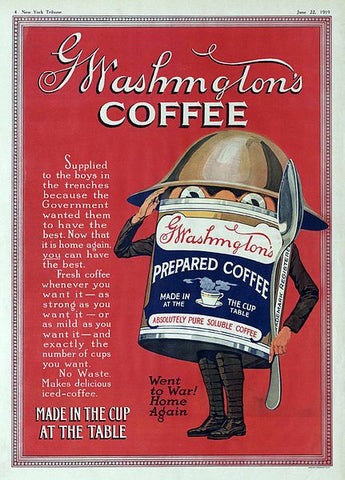
Though President George Washington’s love of coffee was well-known, the Washington in this old advertisement is for George Constant Louis Washington’s coffee, the inventor of instant coffee, with a fortunate name!
The Push Westward and the Civil War
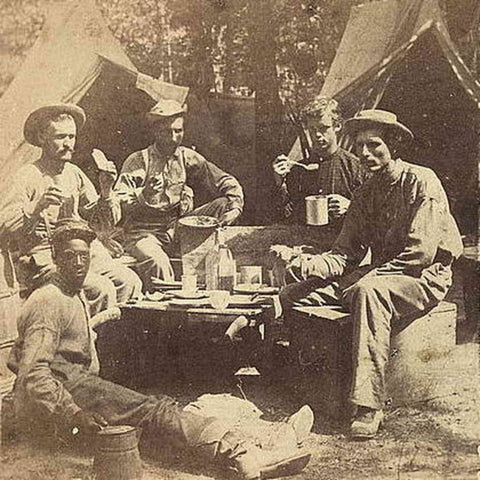
Civil War soldiers enjoy a break from the conflict and a few cups of coffee.
By the mid-1800s, coffee took over as part of the morning rituals of many frontiersmen, cowboys, and settlers, looking to push west. In the wee hours of the morning, folks boiled coffee over an open campfire to start what was sure to be a long, arduous day of travel. In this way, coffee was more than a beverage, but an extension of the spirit and glory of many men pushing westward in the time of Manifest Destiny.
Coffee was also part of America’s defining moment and bloodiest conflict, the Civil War (1861-1865). For soldiers of Union and Confederate forces, coffee was part of their daily rations. Again, coffee was brewed in a kettle, or pot “boiler” over an open fire. Coffee was part of a soldier’s early morning routine, and helped to fuel long marches. During wartime, with few comforts, getting a fresh cup of coffee in the morning was too much a soldier’s joy.
Recalling his time in the Union Army years later, John Billings, a 10th Massachusetts Volunteer Artilleryman wrote this in his memoir:
“What a Godsend it seemed to us at times! How often after being completely jaded by a night march…have I had a wash, if there was water to be had, made and drunk my pint or so of coffee and felt as fresh and invigorated as if just arisen from a night’s sound sleep!”
While coffee certainly didn’t win the war, it did help to keep soldiers going. Moreover, the Civil War was the event that truly made coffee America’s beverage. Many young men became accustomed to the beverage during the war, and carried on the habit for years thereafter. In the final decades of the 19th century the rise and popularity of coffee continued to grow.
Stay Tuned for Part 2
We have seen in this first part in this two-part series that coffee has some bold and manly origins. Coffee was forged as much on the battlefield as it was percolated in the pot. Originally, coffee was not such a popular beverage in America, but people grew to love its power to give one the get-up-and-go. Something that was of paramount importance for a nation that was always on the move.
More Articles in This Series:
- The Manly History of Coffee: Part 1 - Westward to the Civil War
- The Manly History of Coffee: Part 2 - The 20th Century to Today
— Erik Hill is an Adjunct English Instructor at Davidson County Community College in North Carolina. He is an avid trail runner, whose interests revolve around history and English literature. He spends most of his days dreaming of the days of yore. —

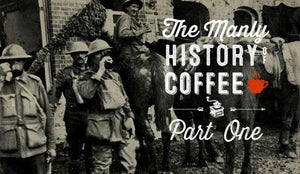
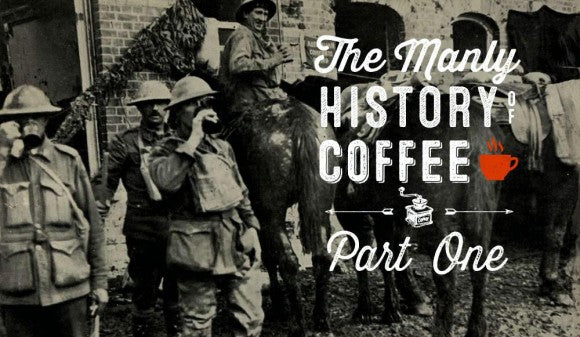
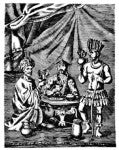 “Coffee is the common man’s gold, and like gold it
“Coffee is the common man’s gold, and like gold it 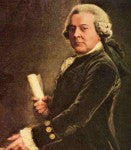 “Accordingly I have drank Coffee every Afternoon since, and have borne it very well. Tea must be universally renounced. I must be weaned, and the sooner, the better.” – John Adams
“Accordingly I have drank Coffee every Afternoon since, and have borne it very well. Tea must be universally renounced. I must be weaned, and the sooner, the better.” – John Adams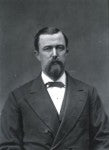 “What a Godsend it seemed to us at times! How often after being completely jaded by a night march…have I had a wash, if there was water to be had, made and drunk my pint or so of coffee and felt as fresh and invigorated as if just arisen from a night’s sound sleep!”
“What a Godsend it seemed to us at times! How often after being completely jaded by a night march…have I had a wash, if there was water to be had, made and drunk my pint or so of coffee and felt as fresh and invigorated as if just arisen from a night’s sound sleep!”